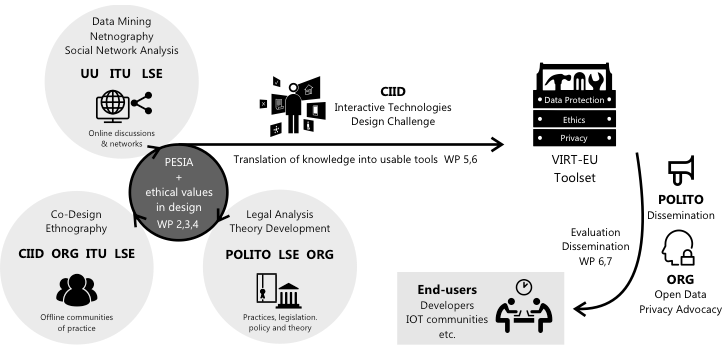Values and Ethics in Innovation for Responsible Technology in Europe
The goal of the project is to analyze and map the ethical practices of European hardware and software entrepreneurs, maker and hacker spaces, and community innovators in order to: (1) understand how IoT innovators enact ethics as they design future devices, (2) generate a new framework for Privacy, Ethical and Social Impact Assessment (PESIA) and (3) develop tools to support ethical reflection and self-assessment as part the design and development process for IoT technologies.

Project Abstract
The networked future promises new relationships between people and artifacts, the private and the public, the individual and the collective. The increased networking capabilities of pervasive technologies mean that of personal data are being produced, analyzed, monetized and connected to other data streams in ways that hold both enormous potential and pose profound challenges for European society. Recent policy, such as the EU General Data Protection Regulation, reflects mounting public concerns around emerging data practices, RRI, data ethics and privacy. VIRT-EU addresses these concerns at the point of design through researching and intervening upon the development cultures and ethics of the next- generation IoT innovators. We ask how do European IoT innovators and developers make ethically consequential decisions – about code, hardware and data – for new connective devices? What assumptions about human behavior, privacy and freedom underpin European cultures of IoT innovation? VIRT-EU will analyze and map the ethical practices of European hardware and software entrepreneurs, maker and hacker spaces, and community innovators. Leveraging state of the art collaborative SSH and ICT methodological innovations, our goals are to (1) understand how IoT innovators enact ethics as they design future devices and (2) generate a new framework for Privacy, Ethical and Social Impact Assessment (PESIA), which will proactively position ethical self-assessments in the development process of IoT technologies. These tools, informed by legal approaches, data mining, quantitative and qualitative sociala science and design research serve to secure a place for societal concerns in the generation of new technologies, engaging societal stakeholders in ensuring a digital future which is populated by innovative devices and services that are explicitly aligned with, and conscious of, the ethical and social values held by EU citizens.
Collaborators
The VIRT-EU project includes six European research partners: Uppsala University (Sweden), IT University of Copenhagen (Denmark), London School of Economics (UK), Open Rights Group (UK), Politechnico di Torino (Italy) and Copenhagen Institute of Interaction Design (Denmark).